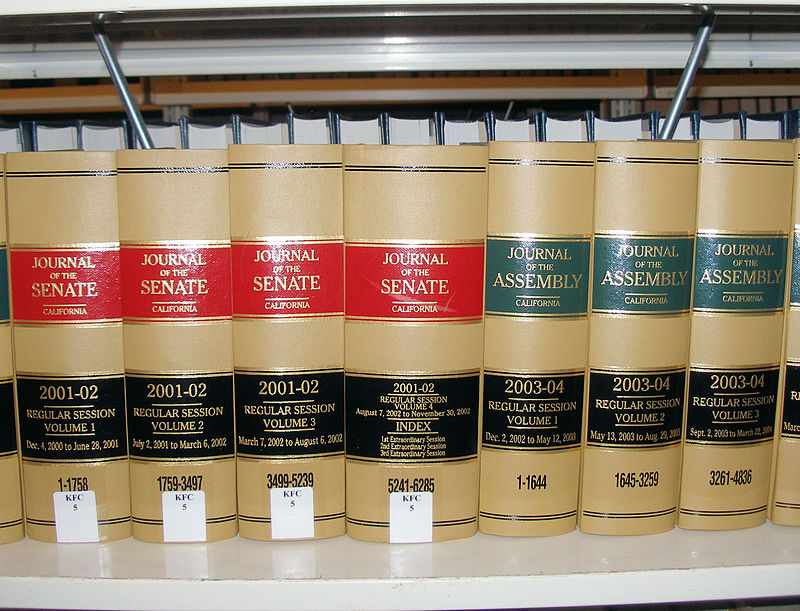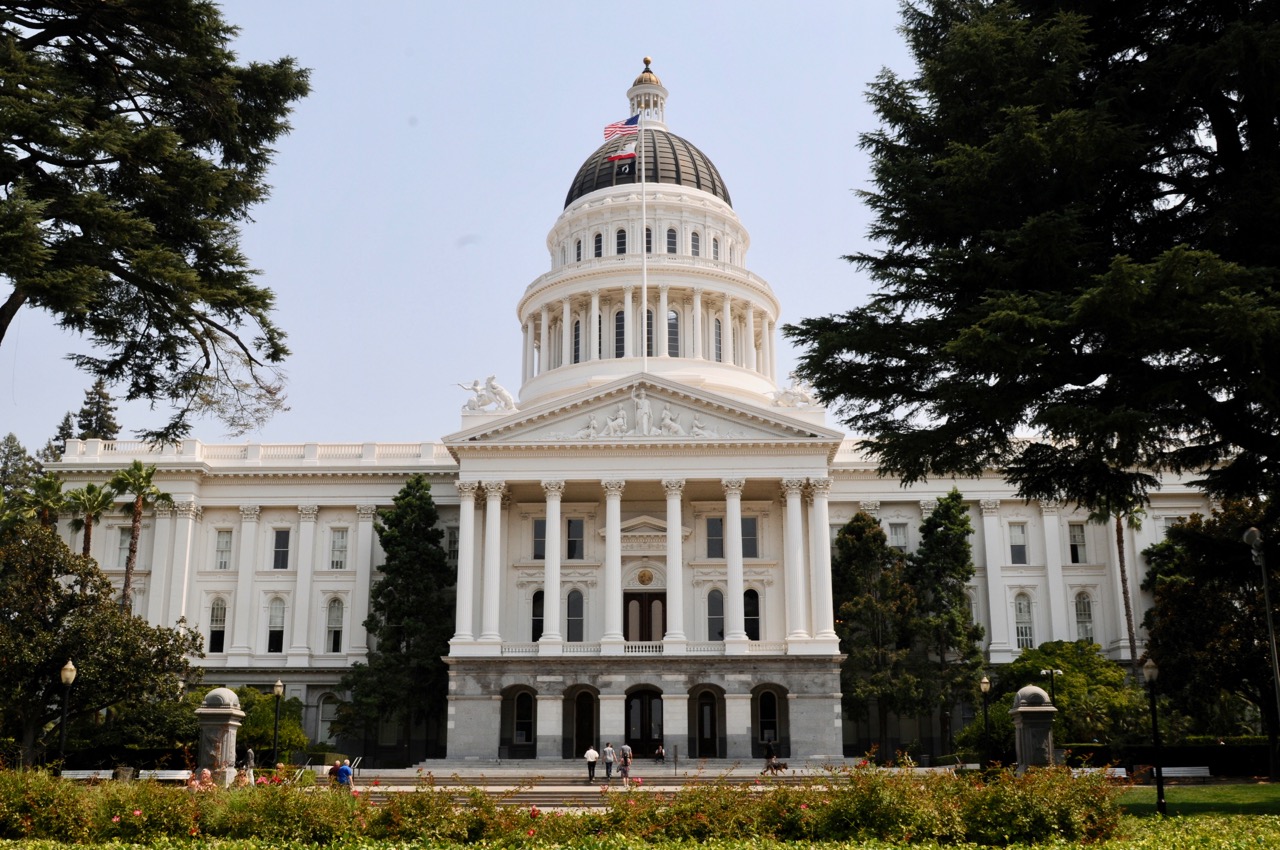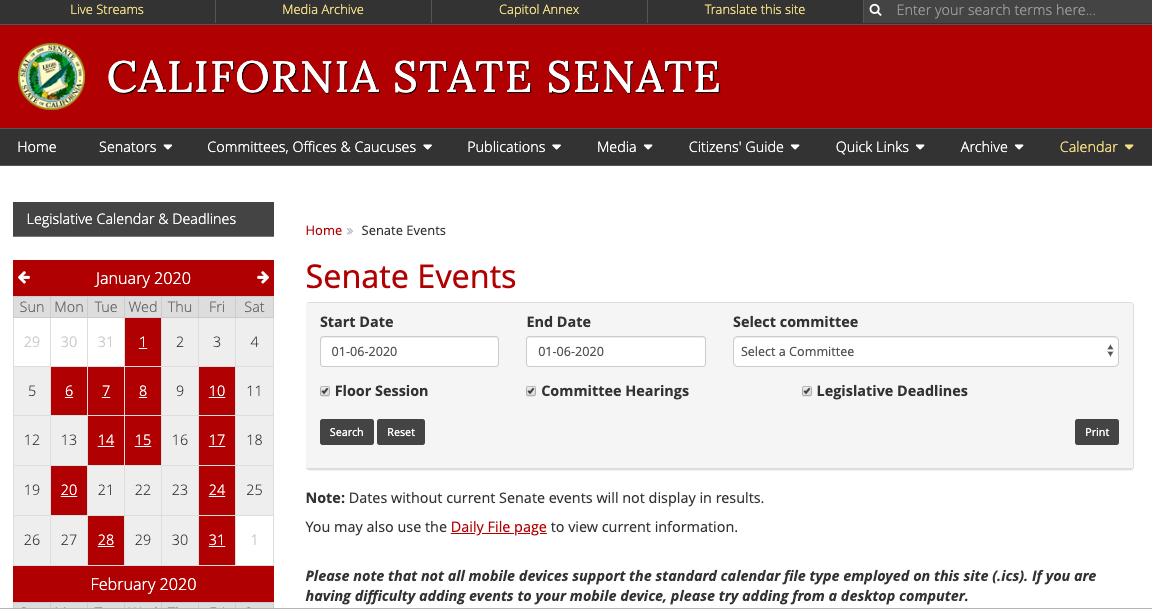
Journals of the California Legislature. (Photo: Wikipedia)
Judging the Qualifications of Members of the California Legislature
The Legislature has constitutional power to suspend Members
By Chris Micheli, December 23, 2019 6:09 am
California Constitution Article IV, Section 5(a)(1) specifies: “Each house of the Legislature shall judge the qualifications and elections of its Members and, by rollcall vote entered in the journal, two-thirds of the membership concurring, may expel a Member.” The courts in this state have determined how far that “judgment” goes.
The Legislature also has constitutional power to suspend Members. Also found in Article IV, but in Section 5(a)(2)(A), “each house may suspend a Member by motion or resolution adopted by rollcall vote entered in the journal, two-thirds of the membership concurring. The motion or resolution shall contain findings and declarations setting forth the basis for the suspension.”
This section of the state constitution also allows the Legislature to deem the salary and benefits of the Member to be forfeited for all or part of the period of the suspension. A suspended Member cannot exercise any of the rights, privileges, duties, or powers of his or her office, or utilize any resources of the Legislature, during the period the suspension is in effect.
The courts have been clear in deferring to the Legislature on the question of judging the qualifications and giving full respect to the explicit language in the state constitution. As a result, challenges to whether a Member is entitled to take his or her seat in the Legislature or whether to remain in office are rarely considered by the courts. One of the most famous cases was between then Assemblymen Ferguson and Hayden.
Under Article IV, Section 5, the Legislature has sole jurisdiction to determine the qualifications of its members and the sole right to expel them from membership. Accordingly, in an action by a veterans’ group to disqualify an assemblyman from holding office because of his alleged support of North Vietnam against the United States during recent hostilities, in reliance on Constitution Article VII, providing that no person who advocates the support of a foreign government against the united States in the event of hostilities shall hold any office or employment under the statute, the trial court properly dismissed the complaint after sustaining defendant’s demurrer without leave to amend.
The appellate ruled that, under the same constitutional principle of separation of powers, plaintiffs were foreclosed from attempts to prohibit the Attorney General or the Secretary of State or the County Registrar from certifying the election results, swearing in, or disbursing money to the assemblyman, or interfering in the Legislature’s determination of the qualifications, fitness and elections of its members. California War Veterans for Justice v. Hayden (1986) 176 Cal.App.3d 982
Similarly, a state appeal court ruled that the judiciary lacked jurisdiction to judge respondent’s qualifications to serve as a senator for the 14th Senate District because Constitution Article IV, Section 5(a) vested in the State Senate the sole authority to judge respondent’s qualifications. The California Constitution vests in each house of the Legislature the sole authority to judge the qualifications and elections of a candidate for membership in that house, even when the challenge to the candidate’s qualifications is brought prior to the primary election. Fuller v. Bowen (2012) 203 Cal.App.4th 1976
More than a hundred years ago, the California Supreme Court ruled that the power conferred upon the Senate by the Constitution to determine the rule of its proceeding and to expel a member is exclusive; and the judicial department has no power to revise even the most arbitrary and unfair action of the legislative department. There is no constitutional provision giving persons who have been expelled the right to have a trial and opportunity to be heard in the Senate other than that which they have received. French v. Senate of California (1905) 146 Cal. 604
Finally, according to the California Attorney General, election of a member of the Legislature to an incompatible office does not have the effect of removal of the legislator from the legislative office as only the house of the Legislature has the power to “judge the qualifications of its members” and so to remove a member. 30 Ops.Cal.Atty.Gen. 56
As you can read, the state’s courts have deferred entirely to the Legislature based upon a clear reading of the state Constitution and the exclusive power of the legislative branch of state government to determine the qualifications of Members of the California Legislature.
- Response to Interrogatories - February 20, 2026
- Insignia of Nonprofit Associations - February 19, 2026
- Endangered Species Regulation - February 19, 2026




